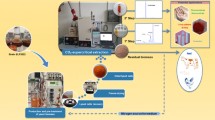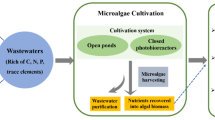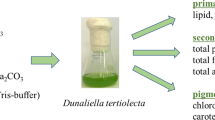Abstract
The presence of inhibitor compounds in the culture medium can cause severe effects on the microorganisms cells. Brewery wastewaters present organic acids (acetic, propionic and butyric acids) which can severely affect yeast cells metabolism, when grown in pure cultures, although in mixed cultures they are able to develop. To understand the physiological changes on Rhodotorula toruloides (formerly Rhodosporidium toruloides) cells when fermenting in the presence of the organic acids present in brewery wastewater, pure and mixed cultures with the microalga Tetradesmus obliquus were performed in a synthetic medium containing the same organic acids concentrations that are present in brewery wastewater at pH 4 and 6. It was concluded that, at pH 4, the organic acids effects in the yeast cells were much more toxic than at pH 6. Moreover, mixed cultures can be an advantage over heterotrophic pure cultures as the microalga is able to contribute for the consumption of potential inhibitors for the yeast.







Similar content being viewed by others
Data availability
The data sets generated during and/or analyzed during the current study are available from the corresponding author on reasonable request.
References
Chalima A, Fernandez de Castro L, Burgstaller L, Sampaio P, Carolas AL, Gildemyn S, Velghe F, Ferreira BS, Pais C, Neureiter M, Dietrich T, Topakas E (2021) Waste-derived volatile fatty acids as carbon source for added-value fermentation approaches. FEMS Microbiol Lett 368(9):1–12. https://doi.org/10.1093/femsle/fnab054
Dias C, Sousa S, Caldeira J, Reis A, Lopes da Silva T (2015) New dual-stage pH control fed-batch cultivation for the improvement of lipids and carotenoids production by the red yeast Rhodosporidium torulides NCYC 921. Bioresour Technol 189:309–318. https://doi.org/10.1016/j.biortech.2015.04.009
Dias C, Silva C, Freitas C, Reis A, Lopes da Silva T (2016) Effect of medium pH on Rhodosporidium toruloides NCYC 921 carotenoid and lipid production evaluated by flow cytometry. Appl Biochem Biotechnol 179(5):776–787. https://doi.org/10.1007/s12010-016-2030-y
Dias C, Gouveia L, Santos JAL, Reis A, Lopes da Silva T (2020b) Using flow cytometry to monitor the stress response of yeast and microalgae populations in mixed cultures developed in brewery effluents. J Appl Phycol 32:3687–3701. https://doi.org/10.1007/s10811-020-02236-8
Dias C, Reis A, Santos J, Lopes da Silva T (2020a) Concomitant wastewater treatment with lipid and carotenoid production by the oleaginous yeast Rhosdosporidium toruloides grown on brewery effluent enriched with sugarcane molasses and urea. Process Biochem 94:1–14. https://doi.org/10.1016/j.procbio.2020.03.015
Dias C, Gouveia L, Santos JAL, Reis A, Lopes da Silva T (2022b) Rhodosporidium toruloides and Tetradesmus obliquus populations dynamics in symbiotic cultures, developed in brewery wastewater, for lipid production. Curr Microbiol 79(40):1–15. https://doi.org/10.1007/s00284-021-02683-7
Dias C, Reis A, Santos JAL, Gouveia L, Lopes da Silva T (2022a) Primary brewery wastewater as feedstock for the yeast Rhodosporidium toruloides and the microalga Tetradesmus obliquus mixed cultures with lipid production. Process Biochem 113:71–86. https://doi.org/10.1016/j.procbio.2021.12.019
Dias C, Santos JAL, Reis A, Lopes da Silva T (2022c) Impact of brewery wastewater inhibitors in pure and mixed cultures of the yeast Rhodosporidium toruloides NCYC 921 and the microalga Tetradesmus obliquus ACOI 204/07. Biochem Eng J 185:108518. https://doi.org/10.1016/j.bej.2022.108518
Fei Q, Chang HN, Shang L, Choi J, Kim N, Kang JW (2011) The effect of volatile fatty acids as a sole carbon source on lipid accumulation by Cryptococcus albidus for biodiesel production. Bioresour Technol 102:2695–2701. https://doi.org/10.1016/j.biortech.2010.10.141
Fei Q, Fu R, Shang L, Brigham CJ, Chang HN (2014) Lipid production by microalgae Chlorella protothecoides with volatile fatty acids (VFAs) as carbon sources in heterotrophic cultivation and its economic assessment. Bioprocess Biosyst Eng 38(4):691–700. https://doi.org/10.1007/s00449-014-1308-0
Fontanille P, Kumar V, Christophe G, Nouaille R, Larroche C (2012) Bioconversion of volatile fatty acids into lipids by the oleaginous yeast Yarrowia lipolytica. Bioresour Technol 114:443–449. https://doi.org/10.1016/j.biortech.2012.02.091
Freitas C, Neves E, Reis A, Passarinho PC, Lopes da Silva T (2012) Effect of acetic acid on Saccharomyces carlsbergensis ATCC 6269 batch ethanol production monitored by flow cytometry. Appl Biochem Biotechnol 168(6):1501–1515. https://doi.org/10.1007/s12010-012-9873-7
Freitas C, Neves E, Reis A, Passarinho PC, Lopes da Silva T (2013) Use of multi-parameter flow cytometry as tool to monitor the impact of formic acid on Saccharomyces carlsbergensis batch ethanol fermentations. Appl Biochem Biotechnol 169(7):2038–2048. https://doi.org/10.1007/s12010-012-0055-4
Guerra R (2005) Water analysis-industrial effluents. In: Worsfold P, Townshend A, Poole C (eds) Encyclopedia of analytical science, 2nd edn. Elseiver, Amsterdam, pp 289–299
Guo Z-P, Olsson L (2016) Physiological responses to acid stress by Saccharomyces cerevisiae when applying high initial cell density. FEMS Yeast Res 16:fow072. https://doi.org/10.1093/femsyr/fow072
Huang H, Xinyan G, Dongmin L, Mengmeng L, Wu J, Ren H (2011) Identification of crucial yeast inhibitors in bio-ethanol and improvement of fermentation at high pH and high total solids. Bioresour Technol 102:7486–7493. https://doi.org/10.1016/j.biortech.2011.05.008
Lino FSO, Basso TO, Sommer MOA (2018) A synthetic medium to simulate sugarcane molasses. Biotechnol Biofuels 11(221):1–12. https://doi.org/10.1186/s13068-018-1221-x
Lopes HJS, Bonturi N, Miranda EA (2020) Rhodotorula toruloides single cell oil production using Eucalyptus urograndis hemicellulose hydrolysate as a carbon source. Energies 13(4):795. https://doi.org/10.3390/en13040795
Lopes da Silva T, Roseiro JC, Reis A (2012) Applications and perspectives of multi-parameter flow cytometry to microbial biofuels production processes. Trends Biotechnol 30:225–232. https://doi.org/10.1016/j.tibtech.2011.11.005
Marchão L, Lopes da Silva T, Gouveia L, Reis A (2018) Microalgae-mediated brewery wastewater treatment: effect of dilution rate on nutrient removal rates, biomass biochemical composition, and cell physiology. J Appl Phycol 30:1583–1595. https://doi.org/10.1007/s10811-017-1374-1
Nelson EK (1929) Some organics acids of sugar cane molasses. J Am Chem Soc 51(9):2808–2810. https://doi.org/10.1021/ja01384a030
Schneider T, Graeff-Hönninger S, French WT, Hernandez R, Merkt N, Claupein W, Hetrick M, Pham P (2013) Lipid and carotenoid production by oleaginous red yeast Rhodotorula glutinis cultivated on brewery effluents. Energy 61:34–43. https://doi.org/10.1016/j.energy.2012.12.026
Wang Q-M, Yurkov AM, Göker M, Lumbsch HT, Leavitt SD, Groenewald M, Theelen B, Liu X-Z, Boekhout T, Bai FY (2015) Phylogenetic classification of yeasts and related taxa within Pucciniomycotina. Stud Mycol 81:149–189. https://doi.org/10.1016/j.simyco.2015.12.002
Yen H-W, Chang J-T, Chang J-S (2015) The growth of oleaginous Rhodotorula glutinis in an internal-loop airlift bioreactor by using mixture substrates of rice straw hydrolysate and crude glycerol. Biomass Bioenerg 80:38–43. https://doi.org/10.1016/j.biombioe.2015.04.026
Zhang K, Zheng J, Xue D, Ren D, Lu J (2017) Effect of photoautotrophic and heteroautotrophic conditions on growth and lipid production in Chlorella vulgaris cultured in industrial wastewater with the yeast Rhodotorula glutinis. J Appl Phycol 29:2783–2788. https://doi.org/10.1007/s10811-017-1168-5
Zhao X, Peng F, Du W, Liu C, Liu D (2012) Effects of some inhibitors on the growth and lipid accumulation of oleaginous yeast Rhodosporidium toruloides and preparation of biodiesel by enzymatic transesterification of the lipid. Bioprocess Biosyst Eng 35:993–1004. https://doi.org/10.1007/s00449-012-0684-6
Acknowledgements
Carla Dias PhD scholarship is sponsored by FCT (Fundação para a Ciência e Tecnologia), Portugal (SFRH/BD/117355/2016). The authors also thank the Biomass and Bioenergy Research Infrastructure (BBRI)-LISBOA-01-0145-FEDER-022059, which is supported by Operational Programme for Competitiveness and Internationalization (PORTUGAL2020), by Lisbon Portugal Regional Operational Programme (Lisboa 2020) and by North Portugal Regional Operational Programme (Norte 2020) under the Portugal 2020 Partnership Agreement, through the European Regional Development Fund (ERDF). The authors thank Céu Penedo for HPLC support, Doctor Luísa Gouveia for the kind supply of the Tetradesmus obliquus ACOI 204/07 strain, Graça Gomes for the microalga maintenance and Dr. Sérgio Marques (Sidul Company, Alhandra, Portugal) for the kind supply of the sugarcane molasses.
Funding
Carla Dias PhD scholarship is sponsored by FCT (Fundação para a Ciência e Tecnologia), Portugal (SFRH/BD/117355/2016).
Author information
Authors and Affiliations
Contributions
CD carried out the experimental work, analyzed the data and drafted the manuscript. TLS coordinated experimental work and revised the manuscript. All authors revised and approved the final manuscript.
Corresponding author
Ethics declarations
Conflict of interest
The authors declare no competing interests.
Ethical approval
Not applicable.
Consent to participate
Not applicable.
Consent for publication
Not applicable.
Additional information
Communicated by Erko Stackebrandt.
Publisher's Note
Springer Nature remains neutral with regard to jurisdictional claims in published maps and institutional affiliations.
Rights and permissions
Springer Nature or its licensor holds exclusive rights to this article under a publishing agreement with the author(s) or other rightsholder(s); author self-archiving of the accepted manuscript version of this article is solely governed by the terms of such publishing agreement and applicable law.
About this article
Cite this article
Dias, C., Santos, J.A.L., Reis, A. et al. Effect of brewery effluent inhibitors on Rhodotorula toruloides NCYC 921 cells grown in pure and mixed cultures at pH 4 and 6. Arch Microbiol 204, 549 (2022). https://doi.org/10.1007/s00203-022-03153-9
Received:
Revised:
Accepted:
Published:
DOI: https://doi.org/10.1007/s00203-022-03153-9




